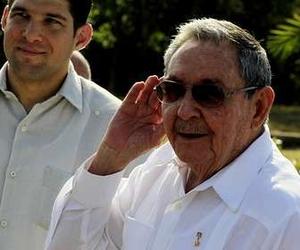Cuba begins transition to a new generation of leaders
- Submitted by: lena campos
- Politics and Government
- 02 / 28 / 2013

Cuban President Raúl Castro said Sunday he will retire in five years and anointed 52-year-old Miguel Diaz-Canel as his new No. 2, signaling the start of a long and desperately awaited transition to a younger leadership in the communist ruled-island.
If the 81-year-old Castro keeps his word in 2018, he will be leaving Cuba without someone named Castro at the helm for the first time in 59 years — something that hasn’t happened since before the 1959 Cuban revolution.
“This will be my last mandate,” he declared to the National Assembly of People’s Power, Cuba’s parliament, after he was elected to a five-year term as head of the ruling council of state, his second since he officially succeeded his ailing brother Fidel in 2008.
Castro also said his proposal last year to limit top officials to two five-year terms will soon be written into the constitution along with a maximum age, but he did not reveal what that age will be.
More importantly, he noted that Diaz-Canel’s election as first vice president of the Council of State marks a moment of “historic transcendence,” when Cuba is moving in a “gradual and orderly” manner toward a new leadership generation.
But Castro then quoted from an old Fidel Castro speech that true revolutionaries don’t seek power — apparently a thinly veiled warning against any jockeying for power as the younger Cubans prepare to assume the reins.
Castro’s announcement wasn’t a surprise and his 37-minute speech to the National Assembly drew just two rounds of applause. Fidel Castro attended the session earlier Sunday, but had walked out by the time his brother spoke.
Diaz-Canel, an electrical engineer and former minister of higher education, served until Sunday as one of the five vice presidents of the Council of State and has sat on the Political Bureau of the Communist Party of Cuba since 2003. He served 16 years as party chief in Villa Clara and Holguin provinces — in effect, as a provincial governor.
He was always regarded as ideologically correct, but liked to joke and was affable and accessible, said a Miami journalist who spent time with him in 1991-93, when both were active in the Union of Communist Youth. The journalist asked to remain anonymous because of his current position. Diaz Canel, who made no comment during the session, replaced Jose Ramon Machado Ventura, 82, who will remain as one of the five vice presidents. Also remaining as a vice president was Ramiro Valdés, 80, viewed as a No. 3 when Machado was No. 2.
Sunday’s developments in Havana drew praise for the apparent start of a generational transition.
Diaz-Canel’s promotion “is the starting point for a total renovation of the Cuban leadership,” predicted Max Lesnik, a Miami radio personality who travels often to the island and meets with Cuban government officials.
“Step by step … [Raul Castro] has been preparing for the day when he will leave his post, and he has now picked the one who will relieve him,” said Washington-based Cuba analyst Phil Peters in his blog, The Cuba Triangle.
But Mauricio Claver-Carone, director of the U.S.-Cuba Democracy political action committee, was less impressed. “It’s fascinating how everyone is closely watching and speculating on the closed circus show of a totalitarian dictatorship, where all of the positions are powerless smoke-screens, subject to the whim of two men named Castro,” he said in his blog, Capitol Hill Cubans .
Havana blogger Yoani Sanchez, visiting in Brazil, welcomed Diaz-Canel’s promotion but said it was “deplorable” that her joy was caused “not by the politics of a candidate but by his age.”
In another key change, the National Assembly selected Esteban Lazo Hernandez, 69, an orthodox ideologue and Cuba’s top black official, to replace Ricardo Alarcon, a veteran foreign affairs expert who was president of the Assembly for the past two decades.
The selection of Lazo, a member of the Political Bureau in charge of ideology, “confirms the cautious focus on possible changes in the political system,” said Arturo Lopez Levy, a Cuban analyst now at the University of Denver.
Alarcon, 75 and a former ambassador to the United Nations, was not a candidate for the assembly. He told friends he wanted to retire, but rumors of his departure started after police arrested his top aide and the aide’s wife last summer on suspicion of spying and corruption.
During his speech, Castro also declared that the reforms he has launched to rescue the economy, in crisis since the collapse of the Soviet Union and its subsidies, will continue but warned again that the shift toward more private economic activity has its limits.
Castro said he would not accept “shock therapies” — a phrase often used to describe post-communist Europe’s rapid shift toward capitalism — although he added that Cuba will become “less egalitarian, but more just.”
“I was not chosen to be president to restore capitalism to Cuba,” Castro declared. “I was elected to defend, maintain and continue to perfect socialism, not destroy it.”
Source: Miami Herald
Comments